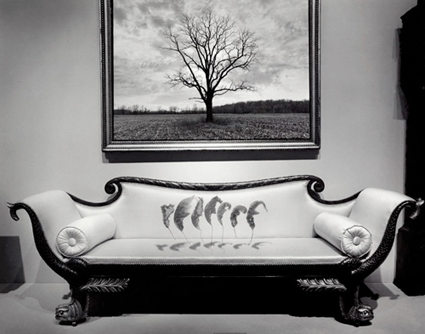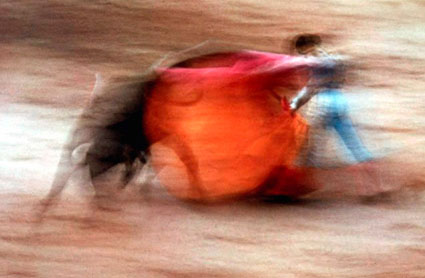28 Quotes By Photographer Annie Leibovitz
Here’s a collection of my favorite quotes by photographer Annie Liebovitz.
“The first thing I did with my very first camera was climb Mt. Fuji. Climbing Mt. Fuji is a lesson in determination and moderation. It would be fair to ask if I took the moderation part to heart. But it certainly was a lesson in respecting your camera. If I was going to live with this thing, I was going to have to think about what that meant. There were not going to be any pictures without it.” – Annie Leibovitz
“One doesn’t stop seeing. One doesn’t stop framing. It doesn’t turn off and turn on. It’s on all the time.” – Annie Leibovitz
“I’ve said about a million times that the best thing a young photographer can do is to stay close to home. Start with your friends and family, the people who will put up with you. Discover what it means to be close to your work, to be intimate with a subject. Measure the difference between that and working with someone you don’t know as much about. Of course there are many good photographs that have nothing to do with staying close to home, and I guess what I’m really saying is that you should take pictures of something that has meaning for you…” – Annie Leibovitz
“My early childhood equipped me really well for my portrait work: The quick encounter, where you are not going to know the subject for very long. These days I am much more comfortable with the fifteen minute relationship, than I am with a life long relationship.” – Annie Leibovitz
“When you are on assignment, film is the least expensive thing in a very practical sense. Your time, the person’s time, turns out to be the most valuable thing.” – Annie Leibovitz
“When I say I want to photograph someone, what it really means is that I’d like to know them. Anyone I know I photograph.” – Annie Leibovitz
“A thing that you see in my pictures is that I was not afraid to fall in love with these people.” – Annie Leibovitz
“Sometimes I enjoy just photographing the surface because I think it can be as revealing as going to the heart of the matter.” – Annie Leibovitz
“In a portrait, you have room to have a point of view. The image may not be literally what’s going on, but it’s representative.” – Annie Leibovitz
“Coming tight was boring to me, just the face… it didn’t have enough information.” – Annie Leibovitz
“The camera makes you forget you’re there. It’s not like you are hiding but you forget, you are just looking so much.” – Annie Leibovitz
“When I take a picture I take 10 percent of what I see.” – Annie Leibovitz
“I think self-portraits are very difficult. I’ve always seen mine as straightforward, very stripped down, hair pulled back. No shirt. Whatever light happened to be available. I’d want it to be very graphic – about darkness and light. No one else should be there, but I’m scared to do it by myself. I’ve been thinking about it for a long time. The whole idea of a self-portrait is strange. I’m so strongly linked to how I see through the camera that to get to the other side of it would be difficult. It would be as if I were taking a photograph in the dark.” – Annie Leibovitz
“Photography’s like this baby that needs to be fed all the time. It’s always hungry. It needs to be read to, taken care of. I had to nourish my work with different approaches. One of the reasons that I went to Vanity Fair was that I knew I would have a broader range of subjects – writers, dancers, artists and musicians of all kinds. And I wanted to learn about glamour. I admire the work of photographers like Beaton, Penn, and Avedon, as much as I respected grittier photographers such as Robert Frank. But in the same way that I’d had to find my own way of reportage, I had to find my own form of glamour.” – Annie Leibovitz
“When I started to be published I thought about Margaret Bourke-White and the whole journalistic approach to things. I believed I was supposed to catch life going by me – that I wasn’t to alter it or tamper with it – that I was just to watch what was going on and report it as best I could. This shoot with John was different. I got involved, and I realized that you can’t help but be touched by what goes on in front of you. I no longer believe that there is such a thing as objectivity. Everyone has a point of view. Some people call it style, but what we’re really talking about is the guts of a photograph. When you trust your point of view, that’s when you start taking pictures.” – Annie Leibovitz
“You don’t have to sort of enhance reality. There is nothing stranger than truth.” – Annie Leibovitz
“What I am interested in now is the landscape. Pictures without people. I wouldn’t be surprised if eventually there are no people in my pictures. It is so emotional.” – Annie Leibovitz
“Nature is so powerful, so strong. Capturing its essence is not easy – your work becomes a dance with light and the weather. It takes you to a place within yourself.” – Annie Leibovitz
“I wish that all of nature’s magnificence, the emotion of the land, the living energy of place could be photographed.” – Annie Leibovitz
“I’d like to think that the actions we take today will allow others in the future to discover the wonders of landscapes we helped protect but never had the chance to enjoy ourselves.” – Annie Leibovitz
“My hope is that we continue to nurture the places that we love, but that we also look outside our immediate worlds.” – Annie Leibovitz
“There are still so many places on our planet that remain unexplored. I’d love to one day peel back the mystery and understand them.” – Annie Leibovitz
“I feel a responsibility to my backyard. I want it to be taken care of and protected.” – Annie Leibovitz
“I am impressed with what happens when someone stays in the same place and you took the same picture over and over and it would be different, every single frame.” – Annie Leibovitz
“If it makes you cry, it goes in the show.” – Annie Leibovitz
“I’ve always cared more about taking pictures than about the art market”. – Annie Leibovitz
“A very subtle difference can make the picture or not.” – Annie Leibovitz
“I actually love talking about taking pictures, and I think that helps everyone.” – Annie Leibovitz
Read more Photographer’s Quotes here.
View Photographer’s Documentaries here.



